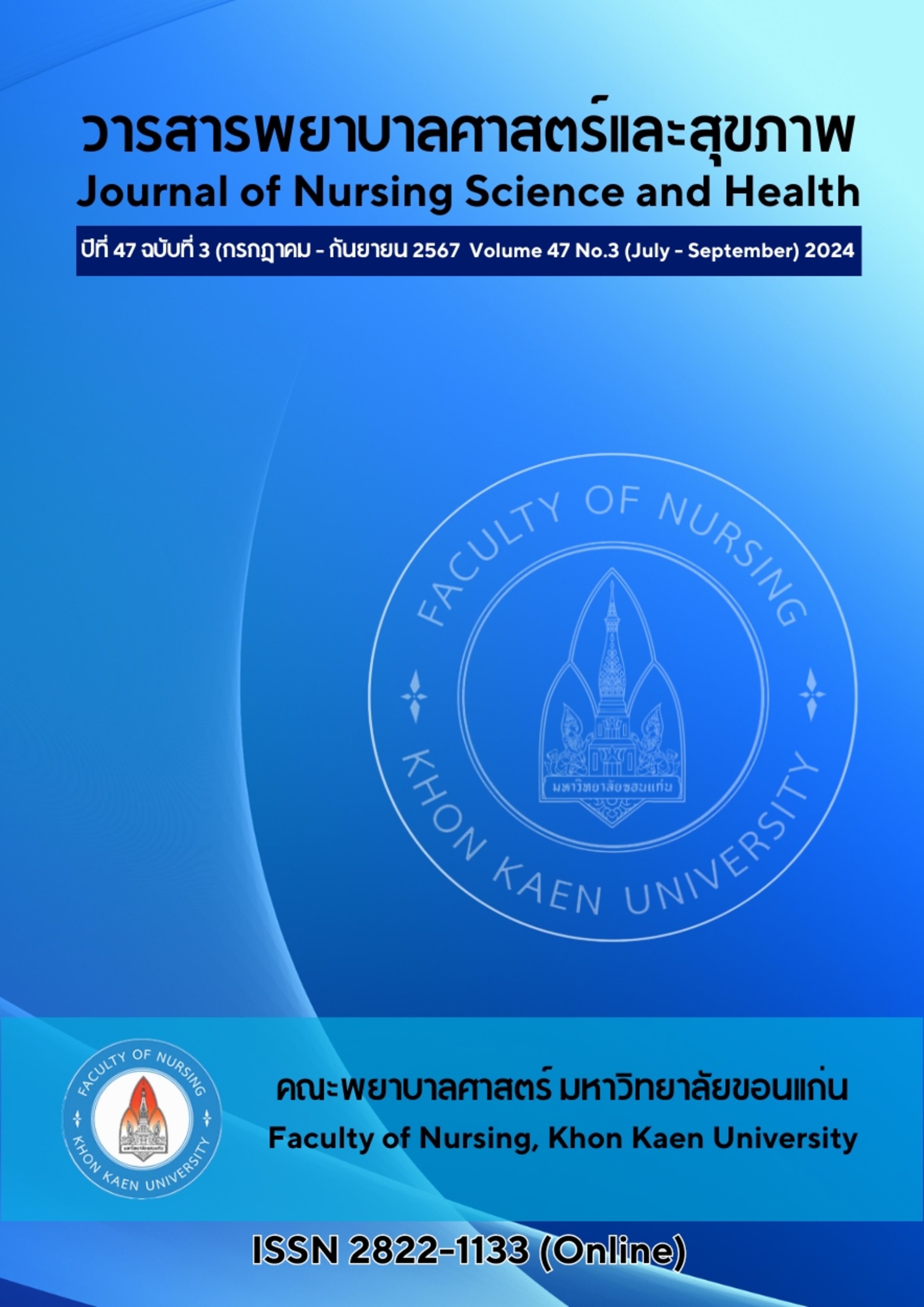การพัฒนาแนวทางการดูแลตนเองของมารดาหลังคลอด
คำสำคัญ:
การดูแลตนเอง , การพัฒนาแนวทาง , การวิจัยเชิงปฏิบัติการ , มารดาหลังคลอดบทคัดย่อ
มารดาหลังคลอดมีการเปลี่ยนแปลงทางด้านร่างกาย อารมณ์ จิตใจ และสังคมที่อาจก่อปัญหาสุขภาพ และส่งผลให้เกิดการเจ็บป่วยและภาวะแทรกซ้อนต่าง ๆ ได้ การวิจัยเชิงปฏิบัติการครั้งนี้ มีวัตถุประสงค์เพื่อศึกษาสถานการณ์ปัญหาและความต้องการในการดูแลมารดาหลังคลอด พัฒนาแนวทางการดูแลตนเองของมารดาหลังคลอด และศึกษาผลของการใช้แนวทางการดูแลตนเองของมารดาหลังคลอดที่พัฒนาขึ้นกลุ่มตัวอย่าง คือ มารดาหลังคลอด ญาติ และทีมผู้ให้บริการด้านสุขภาพ รวมทั้งหมด จำนวน 68 คน การวิจัยแบ่งออกเป็น 4 ระยะ 1) ศึกษาสถานการณ์การดูแลตนเอง ปัญหาและความต้องการของมารดาหลังคลอด 2) พัฒนาแนวทางการดูแลตนเองของมารดาหลังคลอด 3) นำแนวทางไปปฏิบัติ 4) สรุปและประเมินผล
เครื่องมือที่ใช้ในการวิจัยในแต่ละระยะ มีดังนี้ ระยะที่ 1 ได้แก่ แนวทางการสัมภาษณ์เชิงลึกแบบวัดความรู้เกี่ยวกับการดูแลตนเอง แบบสอบถามพฤติกรรมการดูแลตนเอง และแนวทางการจัดประชุมกลุ่ม ระยะที่ 2 ได้แก่ แนวทางการดูแลตนเองของมารดาหลังคลอด และระยะที่ 3 ได้แก่ แบบบันทึกการติดตามเยี่ยมทางโทรศัพท์ ตรวจสอบคุณภาพของเครื่องมือ โดยผู้ทรงคุณวุฒิ 3 ท่าน มีความตรงตามเนื้อหา เท่ากับ .80, .82, .86 และ .90 ตามลำดับ ตรวจสอบความเที่ยงของเครื่องมือได้ค่าสัมประสิทธิ์อัลฟาครอนบาค ได้เท่ากับ .89, .93, .85 และ .91 ตามลำดับ วิเคราะห์ข้อมูล โดยสถิติเชิงพรรณนาและ การวิเคราะห์เชิงเนื้อหา
ผลการวิจัย พบว่า 1) มารดาหลังคลอดส่วนมากมีความรู้เกี่ยวกับการดูแลตนเอง ในระดับปานกลาง และ 2) มารดาหลังคลอดส่วนมากมีการดูแลตนเอง โดยทั่วไป อยู่ในระดับดี การพัฒนาแนวทางการดูแลตนเองของมารดาหลังคลอด ประกอบด้วย 2 แนวทาง คือ (1) การเสริมสร้างความรู้เกี่ยวกับการดูแลตนเองของมารดาหลังคลอด และ (2) การพัฒนาระบบการติดตามเยี่ยมหลังคลอด
ผลจากการนำแนวทางที่พัฒนาขึ้นไปใช้กับมารดาหลังคลอด พบว่า 1) มารดาหลังคลอดและญาติมีความรู้ในเรื่องการเปลี่ยนแปลงหลังคลอด การปฏิบัติตัวหลังคลอด วิธีป้องกันไม่ให้เกิดภาวะแทรกซ้อนและอาการผิดปกติที่ต้องมาพบแพทย์ได้ 2) มารดาหลังคลอดไม่เกิดภาวะแทรกซ้อน ร้อยละ 100 3) มารดาหลังคลอดได้รับการติดตามเยี่ยมบ้านทางโทรศัพท์ ร้อยละ 100 และ 4) มารดาหลังคลอดที่มีปัญหาในการดูแลตนเองได้รับการแก้ไขปัญหา ร้อยละ 100 ดังนั้น แนวทางการดูแลตนเองของมารดาหลังคลอดที่ได้จากการศึกษา จึงทำให้มารดาหลังคลอดมีความรู้ในการดูแลตนเองและมีพฤติกรรมการดูแลตนเองที่ดี และไม่มีภาวะแทรกซ้อนหลังคลอด
เอกสารอ้างอิง
Marshall JE, Raynor MD. Myles textbook of midwives. 17th ed. Poland: Elsevier; 2020.
Giallo R, Seymour M, Dunning M, Cooklin A, Loutzenhise L, McAuslom P. Factors associated with the course of maternal fatigue across the early postpartum period. J Reprod Infant Psychol 2015;335:528-44.
Leenatham K, Julvanichpong T. The effect of health education program and social support on stress of puerperium. UMT-Poly Journal 2013;11(1):1-11. (in Thai)
Kruekaew J, Kritcharoe S. Thai traditional midwifery care. Songklanagarind J Nurs 2018;38(1):103-10. (in Thai)
Namanee A. The enhancement of the mother and children’s health care: The perspectives from the Thai medication and the modern medication. TMJ 2013;13(1):79-88. (in Thai)
Sittipa K, Baosoung C, Sansiriphun N. Anxiety, social support, and postpartum functional status among first-time mothers. Nursing J 2017;44(3):30-40. (in Thai)
Techataweewan P. Maternal nursing infants and midwifery 1. Bangkok: College of Nursing and Health Suan Sunandha Rajabhat University; 2016. (in Thai)
Srihawech T, Juthamanee S, Maleewon K, Sujarae A, Techasatian K. A postpartum women education system on mobile device. JOPN 2019;11(2):474-82. (in Thai)
Kongsuriyanawin W, Khunrattanaporn B, Techatrisak K. Affecting postpartum women's mental health. JTNMC 2012;25(1):88-99. (in Thai)
Streubert HJ, Carpenter DR. Qualitative research in nursing advancing the humanistic imperative. 3rd ed. Philadelphia: Lippincott; 2003.
Nilvarangkul K. Action research and participatory action research: background and connection. Journal of Nursing and Therapeutic Care 2013;31(3):23-8. (in Thai)
Orem DE. Nursing: Concepts of practice. 4th ed. St. Louis: Mosby Yearbook; 1991.
Kemmis S, McTagart R. The action research planer. 3rd ed. Victoria: Deakin University; 1988.
Patirupa C. The development of guidelines for self-care among postpartum women in Wang Sam Mo district, Udon Thani Province [Thesis]. Udon Thani: Udon Thani Rajabhat University; 2013.
Likert R. The method of constructing and attitude scale, reading in attitude theory and measurement. New York: John Wiley & Son; 1967.
Lertsakornsiri M, Saibae S, Charoenwoodhipong S. The effect of nursing model integrated with family support and empowerment on breastfeeding in the first-time teenage postpartum mothers. JRTAN 2018;19(special):129-38. (in Thai)
Narong T, Suppasri P, Siriarunrat P. Effect of the maternal roles enhancing program on perception of family support and success in maternal role attainment among postartum adolescents. JFONUBUU 2014;22(1):15-26. (in Thai)
Green LW, Kreuter MW. Health promotion planning: an educational and environment approach. Toronto: Mayfield; 1991.
Pender NJ. Health promotion in nursing practice. 3rd ed. California: Appleton & Lange; 1996.
ดาวน์โหลด
เผยแพร่แล้ว
รูปแบบการอ้างอิง
ฉบับ
ประเภทบทความ
สัญญาอนุญาต
ลิขสิทธิ์ (c) 2024 วารสารพยาบาลศาสตร์และสุขภาพ

อนุญาตภายใต้เงื่อนไข Creative Commons Attribution-NonCommercial-NoDerivatives 4.0 International License.
วารสารพยาบาลศาสตร์และสุขภาพเป็นเจ้าของลิขสิทธิ์ในการเผยแพร่ผลงานที่ตีพิมพ์ห้ามผู้ใดนำบทความที่ได้รับการตีพิมพ์ในวารสารพยาบาลศาสตร์และสุขภาพไปเผยแพร่ในลักษณะต่าง ๆ ดังนี้ การนำบทความไปเผยแพร่ออนไลน์ การถ่ายเอกสารบทความเพื่อกิจกรรมที่ไม่ใช่การเรียนการสอน การส่งบทความไปตีพิมพ์เผยแพร่ที่อื่น ยกเว้นเสียแต่ได้รับอนุญาตจากวารสารพยาบาลศาสตร์และสุขภาพ



